Logistic Profession in Poland. Offer in 2018 and the possibilities for the future Jolanta Maroń
- Autor:
- Jolanta Maroń
- Wydawnictwo:
- SELF-PUBLISHER
- Ocena:
- Stron:
- 74
- Dostępne formaty:
-
PDFePubMobi
Opis
książki
:
Logistic Profession in Poland. Offer in 2018 and the possibilities for the future
Logistics has always been an inseparable element of the functioning of enterprises as when something was produced, it had to be transported further. The logistics department also counted in the production department to ensure that all processes were optimized and generated as little as possible, for example, a production line for Henry Ford, which revolutionized the production market. However, recently, with the intensification of the flow of goods, logistics has become even more important. Logistics covers a wide range of activities and is characterized by combining information from many fields. Every year, more and more solutions are created regarding the optimization of the flows of goods, people or information. It is a dynamically developing field of interdisciplinary character, which is very important in the functioning of enterprises. Thanks to the wise management of flows, the company can save a lot of money, which would later be invested in, for example, development.
Nowadays, logistics is becoming an increasingly used tool. This happens, among others due to the increased popularity of the e-commerce channel, hence the development of the KEP market. Logistics includes other departments that are particularly important to all organizations, regardless of the type of activity they run. Enterprises are increasingly focused on having specialized logistics employees. In order to meet the expectations of employers, you need to have specific qualifications that will ensure the collection of appropriate education. Status and changes that have occurred in recent years in the offer of logistic education in Poland.
In the area of logistic training for the academic year 2016/2017, two non-public institutions educating logisticians in various fields were liquidated, and five such institutions were opened in the group of public universities. At the same time, the share of non-public higher education institutions is still larger by 23 institutions and amounts to 71 higher education institutions. In the same academic year, three public higher schools were created to educate logistic specialists in logistics, and one such non-public institution was liquidated. The number of non-public universities offering the specialization of logistics is also higher than the number of such public universities and is respectively 31 and 23 schools. Lack of recruitment and launching logistics studies is caused by the maladjustment of the program offer to the requirements of the labor market. In the academic year 2016/2017, in the public and private universities, there were about 61,000 students studying logistics in various fields of study. Students, (including about 54 thousand in first-cycle studies and approximately 7,000 at the second degree studies) The directions in which the logistics education at public universities is implemented are: Logistics, Management, Transport, Economics, Finance and Accounting, International Relations, Production Management and Engineering, and Eurologistics. Their number was constant within two years whereas the number of possible logistic specialties or logistic subjects for these trends is on the rise. The number of specialties with logistic items has increased to a small extent, however, the number of logistics specialties significantly. A dramatic change from 2014 to 2017 was observed in the field of Economics (from 14 to 46), Management and Production Engineering (from 16 to 36) and European Studies (from 7 to as many as 75). However, a large number of specialties make study programs unmatched to market needs. Universities that identify the needs of employers reduce the number of special- ties. The directions within which the logistic education at public universities is implemented are: Logistics, Management, Transport, Economy, Finance and Accounting, International Relations. In the case of these universities, a visible change in the number of logistics specialties occurs only in the field of Finance and Accounting (from 3 to 35). The rest level did not show major changes. Therefore, public universities are leading in multiplication of specialties.
One gets the impression that universities do not focus on specialist education to the extent that they have potential. Taking the example of the Cracow University of Economics, only 11 out of 49 subjects (i.e. less than 23%) are strictly logistic in nature, and most of them are largely duplicated. It is the programs of high schools with logistic education that take up the knowledge on the widest possible spectrum of possible topics. Certainly, it is difficult to get students’ complete satisfaction with the offer as the curriculum must also be based on subjects that give basic knowledge about economics, markets and the laws that govern them. Some interest in studies would increase significantly if universities offered science, e.g. in the field of IT programs used in various logistics departments.
The number of postgraduate studies in logistics in the period of three years at school offer has slightly increased (from 63 in the academic year 2013/2014 to 73 in the academic year 2016/2017). These programs created by universities are more flexible and better adapted to the conditions of the labor market. There was a change in the number of public universities conducting post- graduate studies in logistics in relation to the previous academic year from 31 to 32 institutions and private universities conducting post-graduate studies in logistics from 53 to 67 institutions. At non-public universities, the number of postgraduate studies in logistics is twice as high, and this proportion has not changed for many years. This may be due to the fact that the lower human and academic potential of these universities facilitates the formulation of first or second cycle programs. A positive phenomenon is the fact that postgraduate studies are a sufficient source of knowledge and professional preparation, and a great complement to those who have similar education at the same time acquired in the first or second cycle.
In recent years, there has been a steady increase in the number of training centers offering logistics training and the number of training programs, in 2017 there were 157 training centers and 238 training programs available. They are extremely helpful in enriching the knowledge and skills of employees, and this is necessary due to the lack of basic skills for candidates interested in logistic work. In addition, these trainings are not only addressed to candidates for work in logistic professions. It is used by many enterprises to improve the professional competence of their employees who have to deal with continuous and rapid changes in business logistics, such as the dynamic development of new sales channels, the development of information technologies and the progressive digitization of supply chains.
In Poland, logistics can be obtained at the junior and senior level. They are granted by the European Logistics Certification System coordinated by the European Board for Certification in Logistics (EBCL). Unfortunately, in recent years there has been a significant decline in interest in this certification. The main reason was the exhaustion of the main financial supply for trainings preparing candidates for certification, which was the European Social Fund. The number of participants in the certification process at the junior level de- creased dramatically (from 211 in 2015 to 29 in 2017), while at the senior level it decreased (from 22 in 2016 to 3 in 2017) At the same time, the proportion between the number of participants in the certification process and the number of certificates obtained has improved. In Poland, it is also possible to obtain a Candidate Term Certificate, which change to the full European Logistician Competence Certificate takes place after the candidate has acquired relevant professional experience. The first Candidate European Junior Logistician certificates were issued in Poland in 2016. Having certification is an additional asset in the recruitment processes and the company’s promotion policy.
Logistic education can also take place via electronic systems. However, e-education, with few exceptions, does not constitute a separate educational path, but only a complementary element often used to reduce the number of didactic classes with the lecturer at universities. In education over junior high school, e-learning is a complementary form outside the network of didactic hours. In universities, it is either included in standard teaching hours or is an additional element outside of them. The biggest disadvantage of e- education in secondary and higher schools is the low level of attractiveness of the messages – the most common form are multimedia presentations. In spite of this weakness, the teaching content is increased in the form of scientific blogs, recorded lectures and podcasts distributed through special university channels (such as Sou Tube and Tunes) or e-learning platforms (i.e. on the Moodle platform) and open online lectures, including Mass Open Courses (MOOCs), which have become very popular in recent years, and some education theorists say they will soon be able to compete with official schools. There are also tools available on the market that enable recording and sharing lectures (i.e. Kultura, Echo 360, Mediasite, ClickMeeting), educational games, games adapted for the needs of education, and applications created by students using HTML5 Java Script enabling introduction to the process of learning game elements.
Further congresses or dedicated specialist meetings, which can be attended by specialists, students and anyone interested in the subject matter, have an impact on extending logistics knowledge. In most cases, the admission is free, which is a big advantage affecting the attractiveness of these events and increased attendance. One of such cyclical events is the Transport Days organized by the students of the International Transport and Logistics Fair or the European Economic Congress – the largest economic event in Central Europe, which in 2019 was held in Katowice.
Logistic education can already start at the medium level. These are mainly schools that train in logistic professions: freight forwarder technician, logistic technician and port and terminal operation technicians. In the 2016/2017 school year, approximately 49 thousand students received education in these professions, and in the same year about 5 thousands, after completing the required qualifications and obtaining the professional title of a technician, they became their graduates. It is also possible to receive such education in technical schools that after the reform of education in the same year have gained the fifth year of education, which increases the number of teaching hours and will enable a better education, implementation of teaching programs. Logistics is dominant in them. Other professionals interested in the competition are the forwarding technician and port and terminal operation technicians.
Moreover, since the 2017/2018 school year, recruitment to the first level schools has begun, for which the profession of a warehouseman – logistics officer appeared in the list of professions. In recent years, the number of schools in which logistic specialization technicians have been trained has increased (in total, 694 in 2017 were recorded in Poland). The College of Logistics with headquarters in Poznań organizes the annual National Logistics Olympiad. Although the number of schools participating in the Olympics has decreased, the number of participants has increased (by almost 100 people from 2016/2017 to 2017/2018). The tenth edition of the Olympics took place then
Wybrane bestsellery
self publisher - inne książki
Dzięki opcji "Druk na żądanie" do sprzedaży wracają tytuły Grupy Helion, które cieszyły sie dużym zainteresowaniem, a których nakład został wyprzedany.
Dla naszych Czytelników wydrukowaliśmy dodatkową pulę egzemplarzy w technice druku cyfrowego.
Co powinieneś wiedzieć o usłudze "Druk na żądanie":
- usługa obejmuje tylko widoczną poniżej listę tytułów, którą na bieżąco aktualizujemy;
- cena książki może być wyższa od początkowej ceny detalicznej, co jest spowodowane kosztami druku cyfrowego (wyższymi niż koszty tradycyjnego druku offsetowego). Obowiązująca cena jest zawsze podawana na stronie WWW książki;
- zawartość książki wraz z dodatkami (płyta CD, DVD) odpowiada jej pierwotnemu wydaniu i jest w pełni komplementarna;
- usługa nie obejmuje książek w kolorze.
Masz pytanie o konkretny tytuł? Napisz do nas: sklep@ebookpoint.pl
Książka drukowana


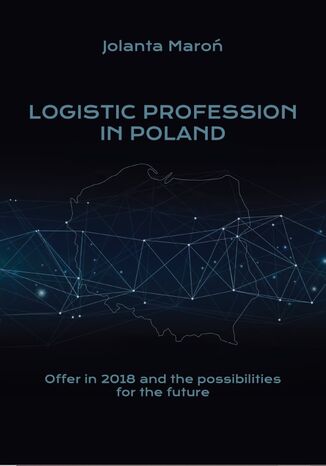













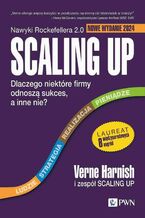










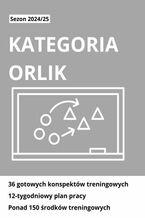
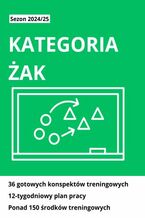

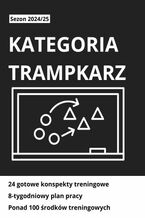

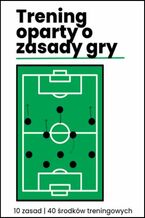
Oceny i opinie klientów: Logistic Profession in Poland. Offer in 2018 and the possibilities for the future Jolanta Maroń
(0)